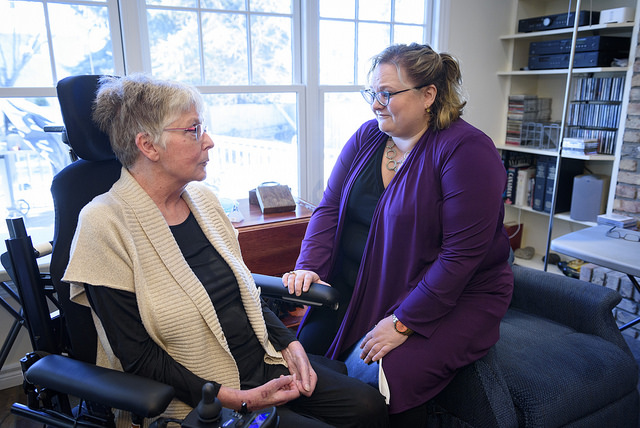“Be still and know that I am God!” — Psalm 46:10
Caregiving is a labor of love. Whether for a family member who is ill, an elderly relative who needs additional assistance, or a young child who needs parental care, the act of giving care to the other is rooted in love and often requires intensive labor. This labor of love can bring ambivalent moments of joy and grief, hope and despair, community and isolation, and affirmation and questioning of one’s self-identity and vocational role. The role of caregiver can be rewarding and challenging simultaneously.
My own experience as a caregiver bears the marks of ambivalence. My father was diagnosed with Alzheimer’s in his early fifties. His diagnosis altered his life and that of our family in tremendous ways as each of us made decisions that impacted our personal and professional lives. Together as a family we were able to provide him with a safe and loving home until his death almost a decade post-diagnosis.
It was tough work.
And yet there were gifts too … I learned to enjoy being in the moment with him, savoring his smile and laugh and the moments of connection in which a memory would spark. “Be still and know …,” I would hear God whisper in the wind as my dad and I walked hand in hand around our family farm.
As I hold my infant daughter in the wee hours of the night I marvel at the similarity of unexpected gifts. “Be still and know …,” I hear God whisper again.
One of my favorite children’s books to read to my daughter is the book Welcome: A Mo Willems Guide for New Arrivals (Hyperion Books for Children, 2017). In the middle of the book, Mo Willems writes, “I have learned these two important things from you: I have learned to STOP and BE.”
This has been the greatest unexpected gift from caregiving — learning to stop and be, or, in Clinical Pastoral Education terms, being fully present in the moment.
It was a parting gift from my dad that has been instrumental in my caregiving as a parent.
The laundry, the dirty dishes, the un-responded emails can be put aside for later as I hold my child and cherish the moment with her. I rejoice in the gift of this beloved child of God and savor her smiles, laughter, and even the smelly diapers. And when her bedtime arrives, I remind myself that my greatest gift to her and me is to stop and be for myself before moving onto household chores or work.
Compassion fatigue and feeling overwhelmed may occur when caregivers neglect to care for themselves. The preacher can provide a gift to the caregiver by:
- recognizing the value of the caregiver’s role and labor of love;
- cultivating the ability to be present in the moment, whether it be one of joy or grief, and then letting that moment go if it needs to be let go, or savoring it and rejoicing in it; and,
- encouraging the caregiver to take time to be and rest in ways that feed the caregiver’s spiritual, mental, physical, and emotional needs.
Much like our vocation as followers of Christ in which we journey through the seasons of life including the beauty and power of Good Friday, Holy Saturday, and Easter Sunday (dying time, tomb/vigil time, and resurrection time), caregivers too are on a journey, living through cycles of dying, tomb, and resurrection. Speak into the brokenness and wholeness of Holy Week. The caregiver has kneeled at the bedside of a dying loved one, waited patiently and in exasperation in the tombs for new life to come, and rejoiced with tears and laughter at God’s bringing of new life.
When these texts show up, consider addressing care for caregivers:
- Psalm 46 (Easter Vigil ABC, Pentecost 9A, Christ the King C)
- Mark 5:21-43 (Pentecost 6B)/ Matthew 9:18-26 (Pentecost 10A)/ Luke 8:40-56 Advocacy on behalf of loved ones is caregiving. Caregivers and those they care for might ask: How do I know wellness, wholeness, and peace in the midst of suffering and in the face of death? How is Jesus accompanying me and my loved one at this time?
- Isaiah 65:17-25 (Advent 3B; Pentecost 26B; Easter Day C) God’s promise of new creation is one of comfort, hope, and rejoicing. As a parent these words resonate with me: “Be glad and rejoice forever in what I am creating” (verses 18a). God has entrusted the care of this child into my hands and that care involves rejoicing over the personhood, gifts, and identity of this beloved child of God. This scripture also speaks to the anguish and resurrection hopes of those caregiving for loved ones who are dying.
- John 11:1-45 (Lent 5A) Jesus was greatly moved by the grief of Lazarus’ sister and wept himself upon the sight of his deceased friend. God incarnate weeps with us in our times of grief. This story also reiterates the hopefulness of the resurrection. My go-to resource book for caregiving, Praying Our Goodbyes by Joyce Rupp (Ave Maria Press, 2009), speaks of the resurrection in terms of hello-goodbye-hello again. She names Easter as the greatest hello and reminds the reader that God is always saying hello to us. For both the caregiver and the one being cared for, such words can provide comfort and hope.
In this bimonthly Working Preacher column, “Preaching + ____,” writers incorporate lived experience into preaching upcoming texts from the Revised Common Lectionary.

